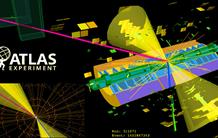Data collected at the LHC (Cern) were processed to provide the most accurate assessment of an asymmetry in top quark and top antiquark production. The result is that the measured value is compatible with the prediction of the standard particle model.
The Standard Model predicts a subtle asymmetry in the production of top quark and top antiquark pairs. It also predicts that the antiparticle of the top quark (top antiquark) is produced at the center of the detector, unlike the top quark.
Based on data from the LHC, physicists have endeavored to produce the most accurate evaluation to date of this asymmetry, in order to probe the validity of their model and to eventually discover the hidden premises of a new physics. Why choose the top quark? Because this quark is the most massive of the elementary particles, as well as the best candidate for this exercise.
The CMS and Atlas collaborations have combined their statistical data (uncertainties, etc.) so as to drastically reduce the error on the final sought after value. With all of the LHC data at 7 and 8 teraelectronvolts, this value remains within the limits predicted by the Standard Model.
The contribution of Atlas to this work was led by Irfu.
Contact : Frédéric Deliot
• The ultimate constituents of matter › Particle physics at colliders




